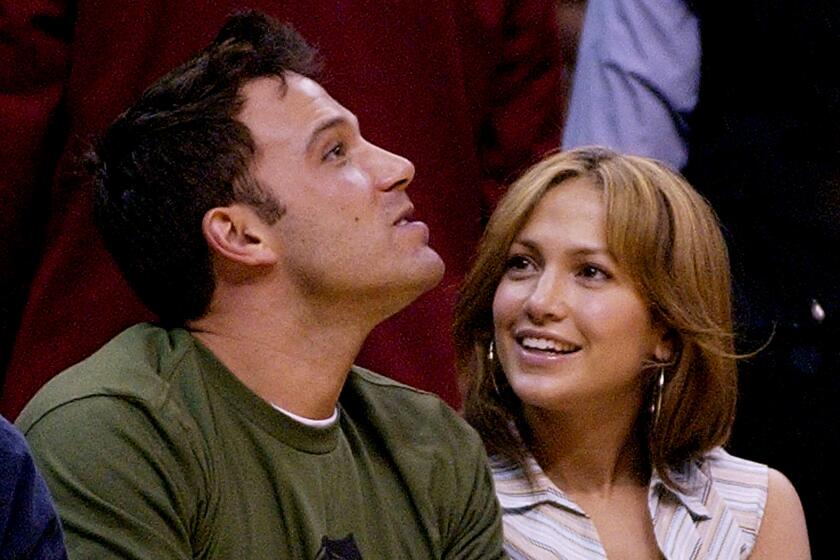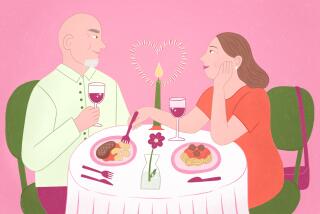Why is Bennifer 2.0 so exciting? Because last time, we screwed it up
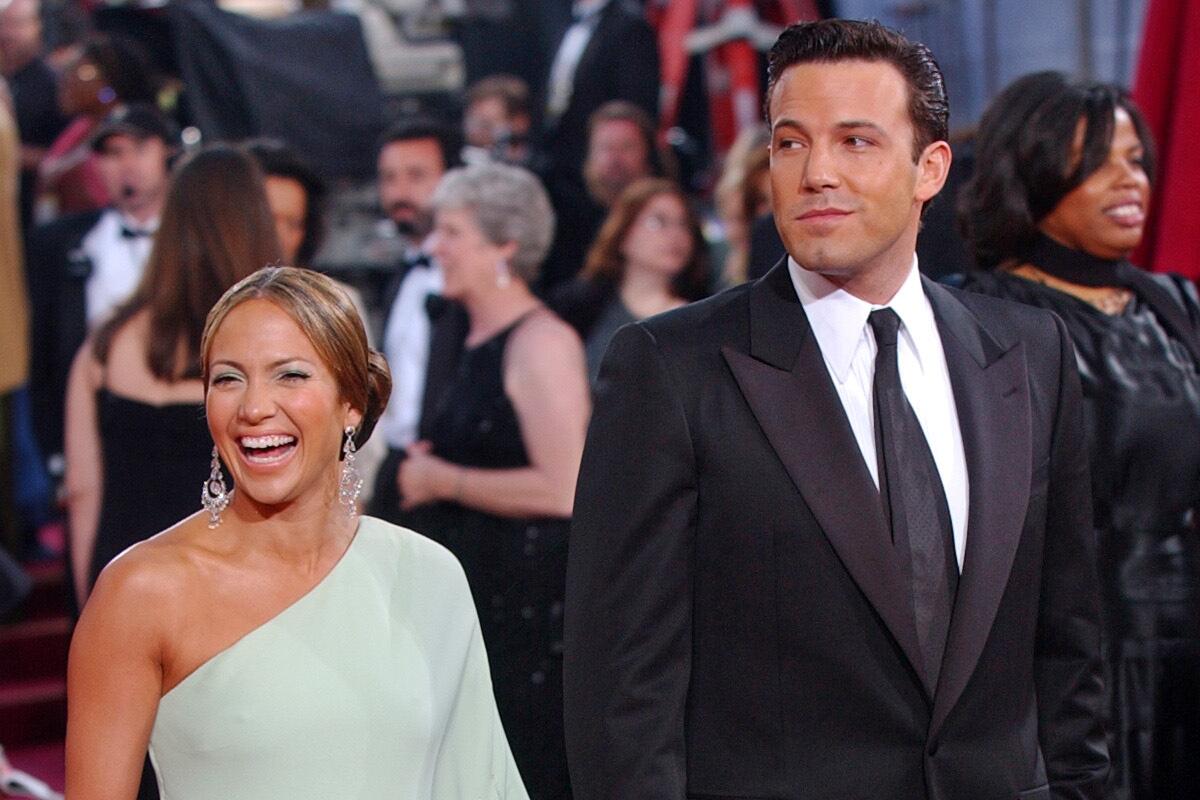
Many regrettable fads from the early aughts are back in style these days: cicadas, recall elections, low-rise jeans.
But the return of at least one phenomenon last seen during George W. Bush’s first term has been met with nearly unanimous glee: Bennifer.
After weeks of rumors about surreptitious meetings in a white SUV, the news broke Monday that Jennifer Lopez and Ben Affleck — the once white-hot couple and glittering tabloid spectacle known as Bennifer — had rekindled their romance after 17 years with a weeklong vacation in Montana. There were even photos to prove it.
The report prompted giddy squeals of joy, the likes of which have not been heard since that time Jennifer Aniston and Brad Pitt said hi to each other on Zoom.
Filmmaker Kevin Smith, who directed the couple in his film “Jersey Girl,” eagerly claimed credit for coining the Bennifer moniker, as if it were a lifesaving vaccine. Comedian Michelle Collins observed that after a few weeks back with Lopez, Affleck was “hot as s— again. I bet his phoenix back tattoo is slowly disappearing like the photo in ‘Back to the Future.’” Even Affleck’s old pal Matt Damon was forced to share his feelings about a possible reunion on “Today.”
“That would be awesome,” he said, deftly capturing the feelings of many.
The elation might be the weirdest thing about Bennifer 2.0. If you’d asked me — or just about anyone — how we felt about the couple’s highly dramatic, exhaustively chronicled relationship back in 2004, we would have said, “Ugh, make them go away.”
Now we’re singing a different tune: Please, Bennifer, come back.
Jennifer Lopez and Ben Affleck, who were engaged before breaking up, have been spotted together 17 years after their split. The internet is intrigued.
So why the collective change of heart?
It’s difficult now to comprehend just how ubiquitous Lopez and Affleck were during their whirlwind romance, which lasted less than two years but generated nearly as much media scrutiny as the case for war in Iraq.
For those of you who have forgotten the details or were too young to be aware of them at the time (rude), here’s a brief refresher: Affleck and Lopez fell for each other in 2002 on the set of the misbegotten stinker “Gigli.” By July, Lopez announced her plans to divorce husband No. 2, Cris Judd, after less than a year of marriage. By November, Lopez and Affleck were engaged and canoodling on a yacht in the video for “Jenny From the Block.”
“Gigli” was released in July 2003 following months of negative buzz and became a flop of legendary proportions, but by that point it was nearly impossible to separate the flaws of the film from the backlash to all things Bennifer.
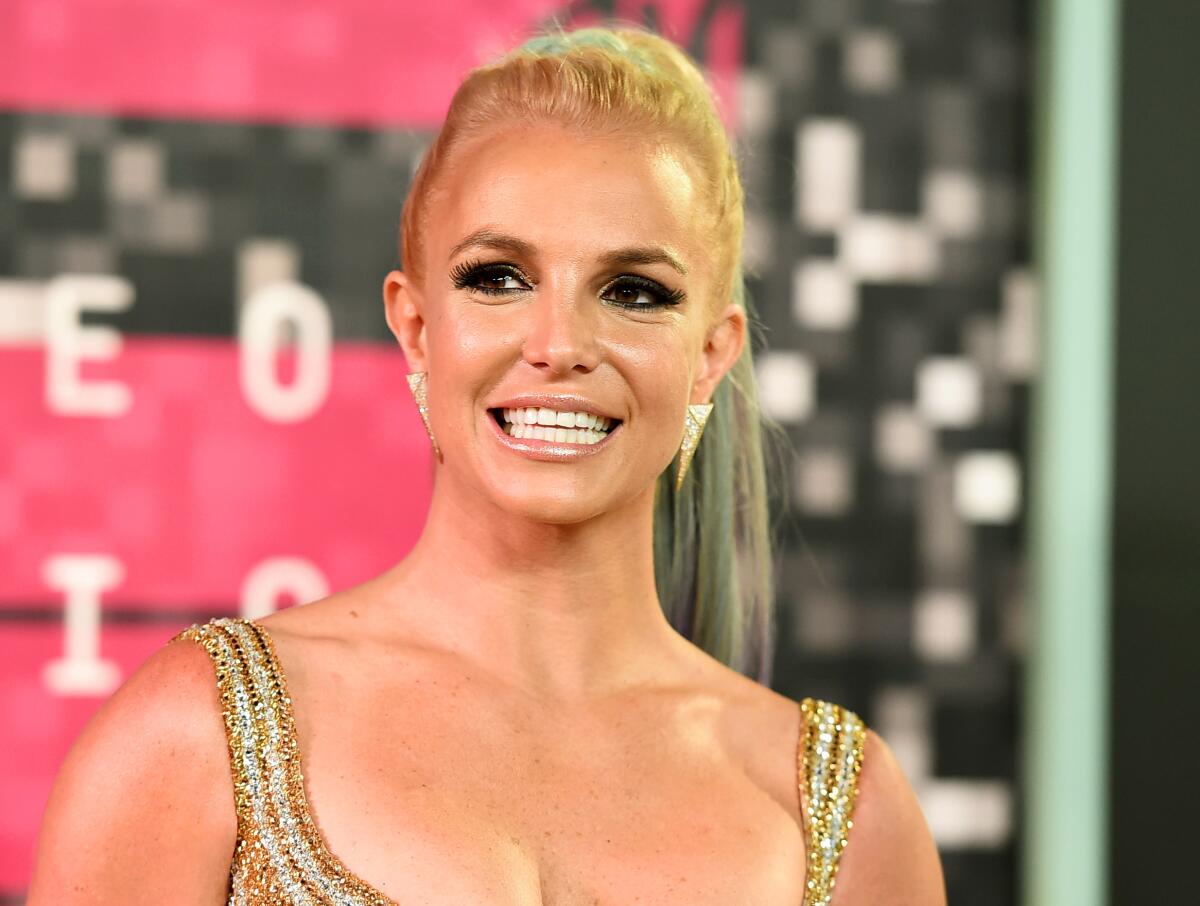
Then, days before Lopez and Affleck were set to say “I do” at a lavish ceremony in September 2003, the couple postponed their wedding, citing the overwhelming media frenzy. They permanently split a few months later. Within a year and a half, both Lopez and Affleck were married to other people, and the public had moved on to breathlessly speculating over Brangelina.
Part of the exuberance about their reunion is the opportunity it presents for a do-over. As we have discovered in the years since Bennifer’s demise, the media was wrong about apparently everything circa 2003-04 — wrong about Britney Spears, wrong about Justin Timberlake, wrong about Howard Dean’s scream, wrong about weapons of mass destruction. Could it have been wrong about Bennifer too?
Lately the culture has reconsidered the narratives about young female celebrities like Spears, Paris Hilton and Jessica Simpson, whose personal foibles became grist for the cruel and misogynist tabloid mill during the early aughts.
Affleck recently complained of the similarly sexist, racist coverage his ex-fiancée was subjected to throughout their relationship. “Ugly, vicious s— was written about her in ways that if you wrote it now you would literally be fired for saying those things you said,” he said. “Now it’s like, she’s lionized and respected for the work she did, where she came from, what she accomplished — as well she f— should be!”
Applying the rigor of “Frontline” to the story of her conservatorship, “Framing Britney Spears” is a pointed work of criticism aimed at celebrity culture.
There were undoubtedly elements of bigotry and chauvinism to much of the original Bennifer backlash — especially to the idea that Lopez was a controlling, spoiled “diva” and a compulsive man-eater. So what if both she and Affleck came from close-knit, middle-class families who knew what it was like to struggle financially? Lopez liked designer clothes and expensive candles and had once — gasp! — dated a rapper, and was thus too flashy and risqué for a nice boy from Boston.
As Diane Sawyer put it in a 2002 report on “Primetime Live,” Lopez was “the racy, impetuous pop star with that flashy ex-boyfriend,” while Affleck was “the brainy guy” and “towering actor who romanced an uptown goddess.” (Never mind that “uptown goddess” Gwyneth Paltrow was not exactly known for being low-key either.)
A Times story from 2004 examined Affleck’s career slump and the particular animosity generated by his relationship with Lopez. Kevin Smith suggested that the backlash “probably had to do with a handsome white guy and a Latino girl. ‘She lends him street cred and he lends her class’ — people would literally write that.’”
Meanwhile, Affleck was portrayed as an emasculated cheeseball who had been blinded by Lopez’s physical allure — buying her a 6-carat pink diamond engagement ring from Harry Winston, trading in his Red Sox T-shirts for camelhair coats and generally being her designer Ken doll. GQ called him the “world’s most overexposed actor,” mocked him for his fake tan (“You showed up at the ‘Gigli’ premiere looking like an overcooked Oompa-Loompa”) and suggested he dump Lopez in favor of “a woman who won’t make you run out to the corner store for a Lamborghini.” (“We have a couple of very nice editorial assistants here who’d be more than happy with a few cranberry vodkas and a ticket to the Shins,” read the piece.)
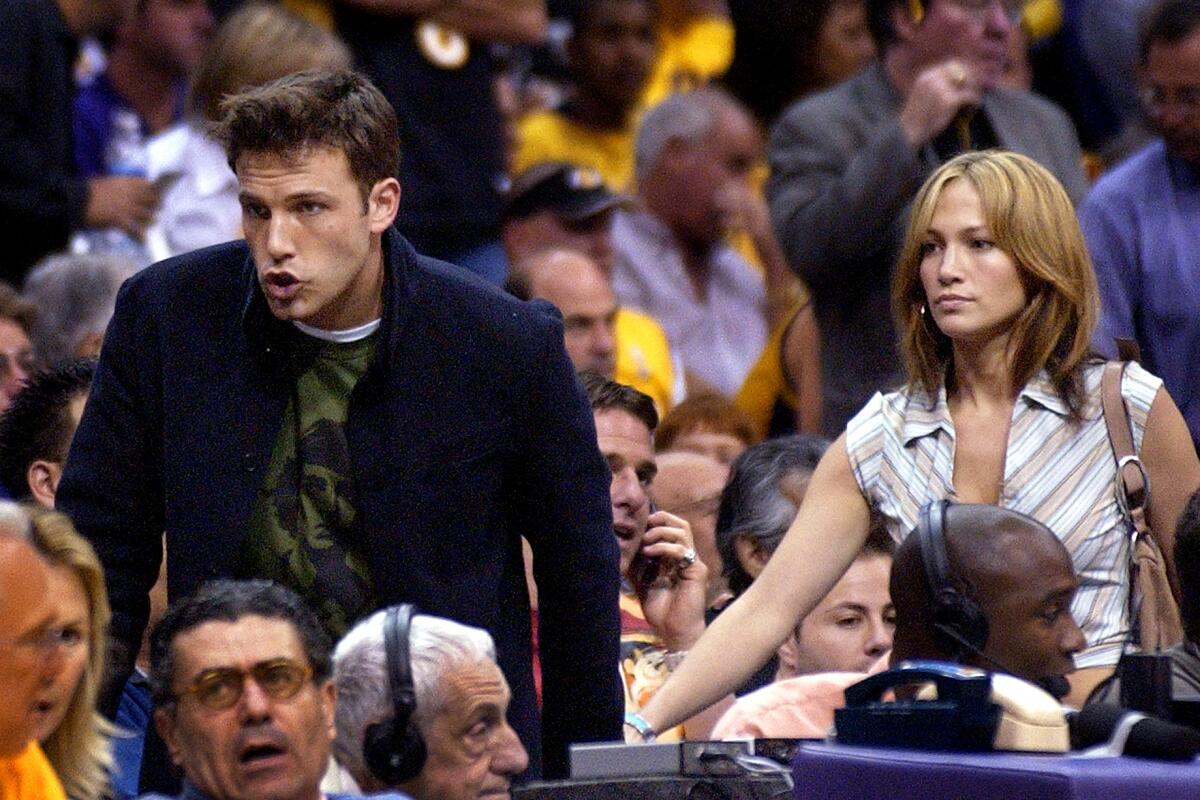
That’s not to say the Bennifer phenomenon wasn’t a little embarrassing at the time. Possibly a lot. If you can watch the video for “Jenny From the Block” without cringing — especially the part where Affleck literally kisses his fiancée’s famous behind — you’re a better person than I. But their worst sin was being ubiquitous, and there was only so much they could do to stop that. As Lopez has said, “We didn’t try to have a public relationship. We just happened to be together at the birth of the tabloids, and it was like, ‘Oh my God.’”
Bennifer 2.0 is not only a chance for Affleck and Lopez to rekindle a once-promising romance as older (and hopefully wiser) people, then. It’s also a chance for the rest of us to just let them be happy.
There is something undeniably captivating about couples who come back to each other, particularly in showbiz — think Elizabeth Taylor and Richard Burton, to whom Bennifer have been compared — and while it is unlikely that we have become less cynical about celebrity romance over the last 17 years, it’s possible that we’ve become fonder of Affleck and Lopez in particular, more forgiving of their very human shortcomings and more sensitive to the private struggles of people no matter their bank balance.
Lopez is now celebrated as Hollywood’s most glamorous workhorse, a fiercely disciplined star who channeled her singular charisma into a should-have-been-nominated performance in “Hustlers” and a dazzling Super Bowl halftime show.
Affleck is finding out how a high-profile romance and a couple of movie flops can harm a reputation.
And though Affleck has had a rougher go of it in the court of public opinion — see: the Sad Batman memes and the mockery of that back tattoo — he also has been bravely upfront about his struggles with alcoholism. We might laugh at some of Affleck’s clumsier missteps, like when a cardboard cutout of his ex, Ana de Armas, ended up in the trash shortly after their breakup. But in the end we’re rooting for him. How could we hold anything against a man so committed to Dunkin Donuts?
Perhaps more than anything, the excitement over the Lopez-Affleck reunion has to do with our shared nostalgia for a celebrity monoculture that is increasingly endangered in 2021.
It is part of what makes “Friends” so enduringly popular and what made Harry and Meghan’s tell-all with Oprah Winfrey in March such an exhilarating spectacle. Yes, there was the very 2021 fact that the Sussexes were calling out the British royal family for its alleged racism and insensitivity to mental health issues. But the interview also felt like a welcome throwback: a prime-time special, hosted by a talk-show legend, watched by millions of people in real time, commercials and all. Is there anything more 2004 than that?
Even though the days of Bennifer don’t seem that far away, at least for those of us over 30, the media landscape was radically different the first time around. Mark Zuckerberg was just a dweeby Harvard student who used his coding skills to rank classmates according to their hotness.
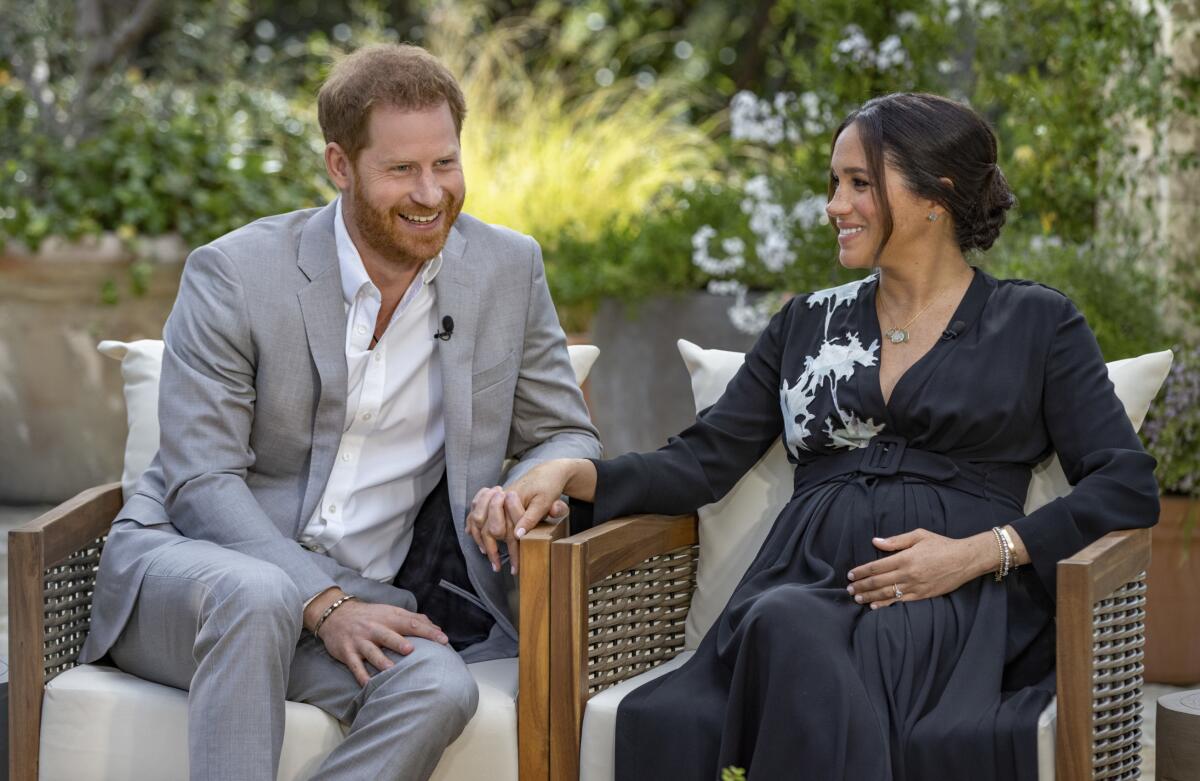
The video for “Jenny From the Block” premiered on “TRL,” MTV’s flagship broadcast and a critical arbiter of popular taste in music for nearly a decade.
US Weekly, revamped as a celebrity tabloid under the leadership of editor Bonnie Fuller, was at the height of its power, with a circulation of 1.1 million. Its success inspired a spate of down-market copycats like InTouch and triggered a gold rush for unstaged, often invasive photos of couples like Lopez and Affleck.
Nearly two decades later, social media has not only reduced the value of paparazzi shots and given stars the power to control what the public sees of their private lives, it also has introduced a whole new breed of celebrity, the influencer. The lines between who is famous and who is just trying to be famous are more blurred than ever, throwing the hierarchy of celebrity into disarray. Who’s the bigger star: the TikTok personality with 70 million followers or the two-time Oscar winner with no social media presence whatsoever? Who the heck knows.
Meanwhile, the erosion of broadcast and cable television and the simultaneous rise of streaming networks has led to more fracturing of taste, with viewers encouraged by the algorithm to hole up in their increasingly narrow cultural silos. Ratings for marquee events like the Oscars have declined precipitously, even when big names like Brad Pitt show up. Star power ain’t what it used to be.
And for Affleck and Lopez, as they apparently try to rekindle a romance that withered in the spotlight, that could be a good thing.
More to Read
The biggest entertainment stories
Get our big stories about Hollywood, film, television, music, arts, culture and more right in your inbox as soon as they publish.
You may occasionally receive promotional content from the Los Angeles Times.
